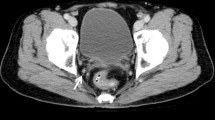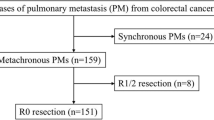Abstract
Background
Precise understanding of recurrence patterns permits efficient surveillance and effective treatment strategies. The aim of this study was to evaluate recurrence patterns after treatment of rectal cancers, specifically with respect to tumor location and chemoradiotherapy (CRT).
Methods
A single-institution, retrospective cohort of 2,086 consecutive rectal cancer patients, was enrolled between January 2000 and December 2007. All the patients underwent curative operations (R0). Tumor location was classified into lower (≤5 cm), middle (>5 to ≤8 cm), and upper (>8 cm) groups based on the distance of the inferior tumor border from the anal verge; the patients were also characterized according to whether they received preoperative/postoperative CRT.
Results
The lung was the most common recurrence site in the lower group (lower vs. middle/upper; 14.6 vs. 8.9 %/8.0 %, P = 0.001/0.001). Recurrence patterns were not associated with receipt of preoperative/postoperative CRT. Additionally, RT and CRT did not reduce the rate of pulmonary recurrence (no-RT/preoperative CRT/postoperative CRT, 37.5/37.9/42.6 %; P = 0.13). In a multivariate analysis, preoperative level of serum carcinoembryonic antigen, abdominoperineal resection, advanced T category, N category, and circumferential resection margin were identified as independent risk factors for pulmonary recurrence in all groups. Otherwise, low rectal cancer was associated with unresectable pulmonary recurrence (RR = 2.19; 95 % CI 1.012–3.072; P = 0.04).
Conclusions
Neither RT nor CRT affects the pattern and rate of recurrence. Tumor location specifically affects recurrence in rectal cancer patients, such that the lower group is a risk factor for unresectable pulmonary recurrences.


Similar content being viewed by others
References
Siegel R, Naishadham D, Jemal A (2013) Cancer statistics, 2013. CA Cancer J Clin 63:11–30
Brenner H, Bouvier AM, Foschi R et al (2012) Progress in colorectal cancer survival in Europe from the late 1980s to the early 21st century: the EUROCARE study. Int J Cancer 131:1649–1658
Galandiuk S, Wieand H, Moertel C et al (1992) Patterns of recurrence after curative resection of carcinoma of the colon and rectum. Surg Gynecol Obstet 174:27–32
van Gestel YR, de Hingh IH, van Herk-Sukel MP et al (2014) Patterns of metachronous metastases after curative treatment of colorectal cancer. Cancer Epidemiol 38(4):448–454
Heald R, Ryall R (1986) Recurrence and survival after total mesorectal excision for rectal cancer. The Lancet 327:1479–1482
Bosset J-F, Collette L, Calais G et al (2006) Chemotherapy with preoperative radiotherapy in rectal cancer. N Engl J Med 355:1114–1123
Sauer R, Liersch T, Merkel S et al (2012) Preoperative versus postoperative chemoradiotherapy for locally advanced rectal cancer: results of the German CAO/ARO/AIO-94 randomized phase III trial after a median follow-up of 11 years. J Clin Oncol 30:1926–1933
Folkesson J, Birgisson H, Pahlman L et al (2005) Swedish Rectal Cancer Trial: long lasting benefits from radiotherapy on survival and local recurrence rate. J Clin Oncol 23:5644–5650
Moertel CG, Fleming TR, Macdonald JS et al (1993) An evaluation of the carcinoembryonic antigen (CEA) test for monitoring patients with resected colon cancer. JAMA 270:943–947
McCarthy K, Pearson K, Fulton R et al (2012) Pre-operative chemoradiation for non-metastatic locally advanced rectal cancer. Cochrane Database Syst Rev 12:CD008368
Watanabe K, Saito N, Sugito M et al (2011) Predictive factors for pulmonary metastases after curative resection of rectal cancer without preoperative chemoradiotherapy. Dis Colon Rectum 54:989–998
Tepper J, O’Connell M, Hollis D et al (2003) Analysis of surgical salvage after failure of primary therapy in rectal cancer: results from Intergroup Study 0114. J Clin Oncol 21:3623–3628
Kim HK, Cho JH, Lee HY et al (2014) Pulmonary metastasectomy for colorectal cancer: how many nodules, how many times? World J Gastroenterol 20:6133
Kobayashi H, Mochizuki H, Sugihara K et al (2007) Characteristics of recurrence and surveillance tools after curative resection for colorectal cancer: a multicenter study. Surgery 141:67–75
Mitry E, Guiu B, Cosconea S et al (2010) Epidemiology, management and prognosis of colorectal cancer with lung metastases: a 30-year population-based study. Gut. doi:10.1136/gut.2010.211557
Ding P, Liska D, Tang P et al (2012) Pulmonary recurrence predominates after combined modality therapy for rectal cancer: an original retrospective study. Ann Surg 256:111–116
Olson R, Perencevich N, Malcolm A et al (1980) Patterns of recurrence following curative resection of adenocarcinoma of the colon and rectum. Cancer 45:2969–2974
Kim JC, Chang SY, Lim SB et al (2013) Abdominoperineal resection and low anterior resection: comparison of long-term oncologic outcome in matched patients with lower rectal cancer. Int J Colorectal Dis 28:493–501
Sauer R, Becker H, Hohenberger W et al (2004) Preoperative versus postoperative chemoradiotherapy for rectal cancer. N Engl J Med 351:1731–1740
Glynne-Jones R, Mawdsley S, Pearce T et al (2006) Alternative clinical end points in rectal cancer: are we getting closer? Ann Oncol 17:1239–1248
Assersohn L, Norman A, Cunningham D et al (1999) Influence of metastatic site as an additional predictor for response and outcome in advanced colorectal carcinoma. Br J Cancer 79:1800
Yamada H, Ichikawa W, Uetake H et al (2001) Thymidylate synthase gene expression in primary colorectal cancer and metastatic sites. Clin Colorectal Cancer 1:169–173
Martijnse IS, Dudink RL, Kusters M et al (2012) T3+ and T4 rectal cancer patients seem to benefit from the addition of oxaliplatin to the neoadjuvant chemoradiation regimen. Ann Surg Oncol 19:392–401
Cercek A, Goodman KA, Hajj C et al (2014) Neoadjuvant chemotherapy first, followed by chemoradiation and then surgery, in the management of locally advanced rectal cancer. J Natl Compr Cancer Netw 12:513–519
Graham RA, Wang S, Catalano PJ et al (1998) Postsurgical surveillance of colon cancer: preliminary cost analysis of physician examination, carcinoembryonic antigen testing, chest X-ray, and colonoscopy. Ann Surg 228:59
Kjeldsen B, Kronborg O, Fenger C et al (1997) A prospective randomized study of follow-up after radical surgery for colorectal cancer. Br J Surg 84:666–669
Nordholm-Carstensen A, Krarup P-M, Jorgensen LN et al (2014) Occurrence and survival of synchronous pulmonary metastases in colorectal cancer: a nationwide cohort study. Eur J Cancer 50:447–456
Acknowledgments
Authors specially appreciate Dr. Kim JH for his dedication to validate histologic findings and clinical staffs in the Colorectal Division (Drs. Lim SB, Kim CW, Park IJ, and Yoon YS) for the valuable provision of clinical database.
Disclosure
This study was supported by Grants (to J.C. Kim) from the Asan Institute for Life Sciences (2014-69), the Korea Research Foundation (NRF-2013R1A2A1A03070986), Ministry of Science, ICT, and Future Planning, the Korea Health 21 R&D Project (HI06C0868 and HI13C1750) and the Center for Development and Commercialization of Anti-Cancer Therapeutics (HI10C2014), Ministry of Health and Welfare, Republic of Korea.
Author information
Authors and Affiliations
Corresponding author
Rights and permissions
About this article
Cite this article
Lee, J.L., Yu, C.S., Kim, T.W. et al. Rate of Pulmonary Metastasis Varies with Location of Rectal Cancer in the Patients Undergoing Curative Resection. World J Surg 39, 759–768 (2015). https://doi.org/10.1007/s00268-014-2870-y
Published:
Issue Date:
DOI: https://doi.org/10.1007/s00268-014-2870-y




